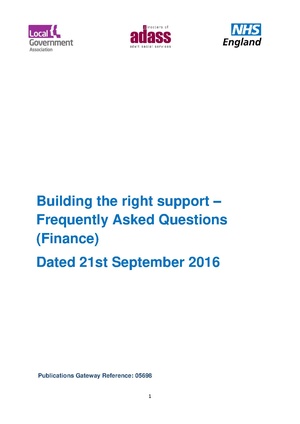NHS England, LGA and ADASS, 'Building the right support - Frequently Asked Questions (Finance)' (updated 21/9/16)
Aftercare guidance Annex A ("'Who Pays' amendment to the section on 'persons detained under the Mental Health Act 1983'") sets out replacements for paragraphs 33 and 34 of the August 2013 Who Pays? guidance.
Text from Annex A
‘Who Pays’ amendment to the section on ‘persons detained under the Mental Health Act 1983’
1. Paragraphs 33 and 34 of the August 2013 ‘Who Pays’ document have been replaced by the following sections (in italics below) effective from 1st April 2016.
‘’If a person is detained for treatment under the Mental Health Act 1983, the responsible commissioner will be as set out in paragraph 1 of the ‘who pays’ guidance. Every effort should be made to determine GP practice registration or establish an address where they are usually resident, but if this fails and the patient refuses to assist, then as a last resort the responsible commissioner should be determined by the location of the unit providing treatment.
It is the duty of both the CCG and the appropriate local authority to commission after-care services for those persons discharged from hospital following detention under one of the relevant sections of the Mental Health Act. The responsible CCG should be established by the usual means (see paragraph 1) for their typical secondary healthcare. However, if a patient who is resident in one area (CCG A) is discharged to another area (CCG B), it is then the responsibility of the CCG in the area where the patient moves (CCG B) to jointly work with CCG A, who will retain the responsibility to pay for their aftercare under section 117 of the Act as agreed with the appropriate local authority. The purpose of this is to ensure that the person has access to local clinical support and advice in the area they will be moving to (CCG B), whilst remaining the commissioning responsibility of the original CCG (CCG A).
If a detained person who has been discharged, and is in receipt of services provided under section 117 of the Mental Health Act, is subsequently readmitted or recalled to hospital for assessment or treatment of their mental disorder, the responsible CCG will continue to be the CCG that is currently responsible for funding the aftercare under section 117 (except where the admission is into specialised commissioned services). If a detained person who was registered with a GP in one area (CCG A) is discharged to another area (CCG B) and is in receipt of services provided under section 117 of the Mental Health Act) is subsequently readmitted or recalled to hospital for assessment or treatment of their mental disorder, it is the responsibility of CCG A to arrange and fund the admission to hospital (except where the admission is into specialised commissioned services). Furthermore, the originating CCG (CCG A) would remain responsible for the NHS contribution to their subsequent aftercare under S117 MHA, even where the person changes their GP practice (and associated CCG).
The table below should provide a useful distinction of the changing commissioner responsibilities for patients discharged under section 117.
- Patients discharged pre 1 April 2013 come under the pre August 2013 PCT Who Pays Guidance and the legacy/originating CCG continues to be responsible for subsequent compulsory admissions under the MHA, and current and subsequent S117 services until such time as they are assessed to no longer need these services.
- Patients discharged between 1 April 2013 and 31 March 2016 fall under August 2013 Who Pays Guidance –CCG B would be responsible if a patient is discharged into a location in CCG B and registers with a GP in CCG B.
- New revised guidance from 1 April 2016 will revert back to the pre 1 April 2013 position where the legacy/originating CCG continues to be responsible in most cases.’’
